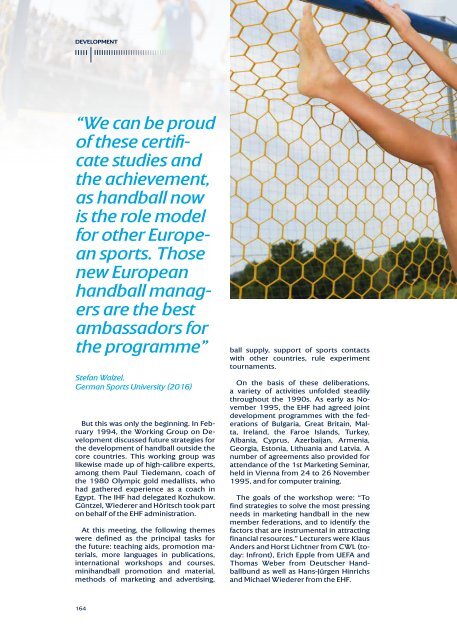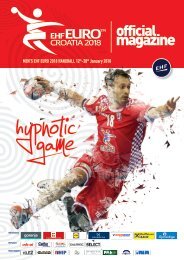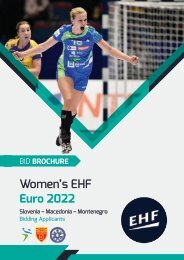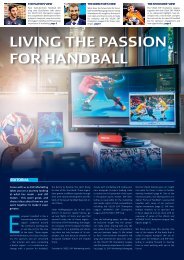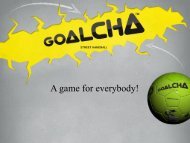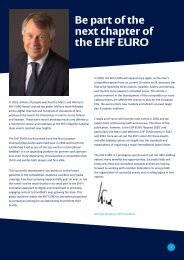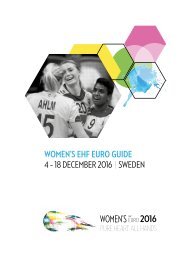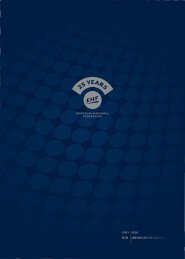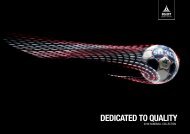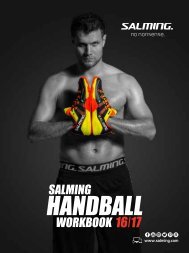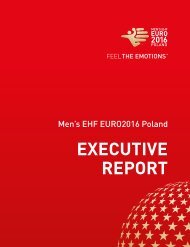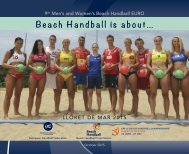ehf_25yers_book_webversion
You also want an ePaper? Increase the reach of your titles
YUMPU automatically turns print PDFs into web optimized ePapers that Google loves.
DEVELOPMENT<br />
“We can be proud<br />
of these certificate<br />
studies and<br />
the achievement,<br />
as handball now<br />
is the role model<br />
for other European<br />
sports. Those<br />
new European<br />
handball managers<br />
are the best<br />
ambassadors for<br />
the programme”<br />
Stefan Walzel,<br />
German Sports University (2016)<br />
But this was only the beginning. In February<br />
1994, the Working Group on Development<br />
discussed future strategies for<br />
the development of handball outside the<br />
core countries. This working group was<br />
likewise made up of high-calibre experts,<br />
among them Paul Tiedemann, coach of<br />
the 1980 Olympic gold medallists, who<br />
had gathered experience as a coach in<br />
Egypt. The IHF had delegated Kozhukow.<br />
Güntzel, Wiederer and Höritsch took part<br />
on behalf of the EHF administration.<br />
At this meeting, the following themes<br />
were defined as the principal tasks for<br />
the future: teaching aids, promotion materials,<br />
more languages in publications,<br />
international workshops and courses,<br />
minihandball promotion and material,<br />
methods of marketing and advertising,<br />
ball supply, support of sports contacts<br />
with other countries, rule experiment<br />
tournaments.<br />
On the basis of these deliberations,<br />
a variety of activities unfolded steadily<br />
throughout the 1990s. As early as November<br />
1995, the EHF had agreed joint<br />
development programmes with the federations<br />
of Bulgaria, Great Britain, Malta,<br />
Ireland, the Faroe Islands, Turkey,<br />
Albania, Cyprus, Azerbaijan, Armenia,<br />
Georgia, Estonia, Lithuania and Latvia. A<br />
number of agreements also provided for<br />
attendance of the 1st Marketing Seminar,<br />
held in Vienna from 24 to 26 November<br />
1995, and for computer training.<br />
The goals of the workshop were: “To<br />
find strategies to solve the most pressing<br />
needs in marketing handball in the new<br />
member federations, and to identify the<br />
factors that are instrumental in attracting<br />
financial resources.” Lecturers were Klaus<br />
Anders and Horst Lichtner from CWL (today:<br />
Infront), Erich Epple from UEFA and<br />
Thomas Weber from Deutscher Handballbund<br />
as well as Hans-Jürgen Hinrichs<br />
and Michael Wiederer from the EHF.<br />
164


